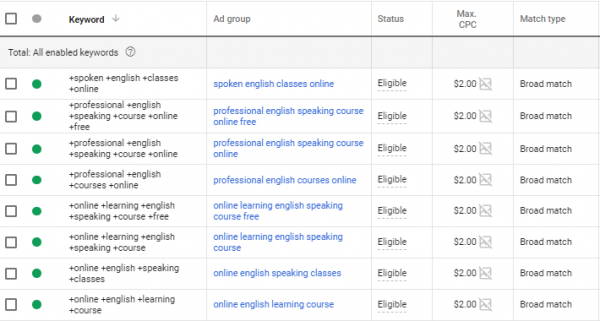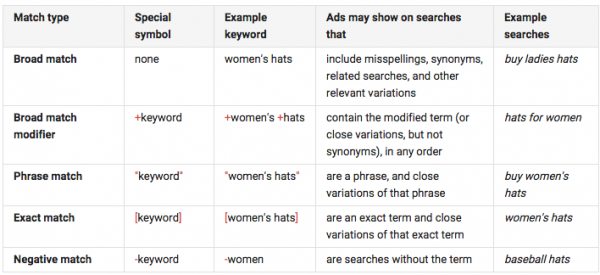Setting up a Google Ads campaign for the first time can be an overwhelming, frustrating experience.
Not only do you have to decide on a budget, where you want your ads to show, and the keywords you want to rank for, you also have to wrap your head around the many features that Google Ads offers.
One of the biggest things to get your head around is the keyword matching options. This relates to the keywords and accompanying phrases that you want your ads to show up for.
It can be tempting to want your ads to show for all related keywords and then some (the more the merrier, right?), but this can be detrimental, particularly if you want to increase conversions or have a specific goal for your ad campaigns.
What are Google Ad keyword types?
This term is used to define parameters set on your keywords to determine which searches and phrases trigger the appearance of your ads. They are also (and perhaps more commonly) known as keyword match types.
There are four different kinds of keyword match types in Google Ads: broad match, broad match modifier, phrase match and exact match.
Each one comes with its own set of advantages and disadvantages, and it’s up to you to understand which ones work best where and for what purpose.
Broad match
This is the default match type that all your keywords are initially assigned. Google wants to get as many eyeballs on your ads as possible, so your ads will not only show for your designated keywords, but also on variations that are misspelt or use synonyms.
For example, if your keyword is "women’s hats", someone searching for "buy ladies hats" or "scarves for women" might also see your ad.
Broad match terms often generate lots of click throughs, but the audience isn’t as targeted. This means you’ll have a lot of traffic but might struggle to get the conversions you want.
Negative keywords
This isn’t a "proper" keyword match type, but it’s worth a mention. Negative keywords essentially stop your ad showing up in searches with that term.
Used in conjunction with broad match types, they can help improve targeting and increase your ROI. Not using negative keywords is one of the main reasons why many Google Ad campaigns underperform.
Broad match modifier
This is similar to the broad match type, except your ads will only show up in searches that feature set modifiers.
Using this type of keyword can be a good middle ground between broad match terms and more restrictive match types (which we’ll move on to in a moment).

Broad match modifier keywords are indicated by the + sign
They basically let you specify certain search terms that must be included in the search for your ad to show up.
For example, if you have "women" and "hats" as modifiers, your ad will only show up in searches that explicitly feature those terms.
Phrase match
Phrase match keywords can be used to make sure your ad is only served when someone types a phrase in the correct order.
For example, if your phrase match keyword is "red women’s hat", your ad will be served for searches like "cheap wool red women’s hat" but not "red hat made from wool for women".
Using this match type eliminates any non-relevant traffic you might get from broad match and broad match modifiers.
The key difference between phrase match and broad match (with or without modifiers) is that phrase match doesn’t include any search terms that contain words in the middle of your phrase (like the "made from wool" example above).
This tends to drive more quality traffic to your site that has a higher chance of converting.
Exact match
Exact match does exactly as it says on the tin: it will only show your ad to people that have typed in the exact search term or close variants. When we say close variants, we mean singular or plural forms, misspellings, abbreviations, and your keywords in a different order but with an identical meaning.
It’s the most restrictive keyword type, but it brings in the most relevant searchers (which means more conversions).
What these keyword types look like in action
Keyword match types may sound like a headache, but they’re actually pretty simple. In fact, Google has put together a handy table to show you what they look like in action:

Understanding the different keyword types is vital if you want to run a successful Google Ads campaign.
It could mean the difference between getting a ton of non-relevant traffic that doesn’t convert and getting highly-targeted searchers who are ready and raring to buy from you.

